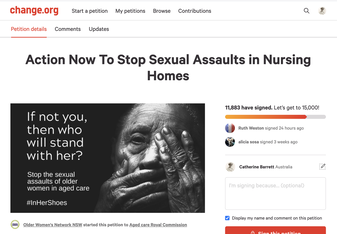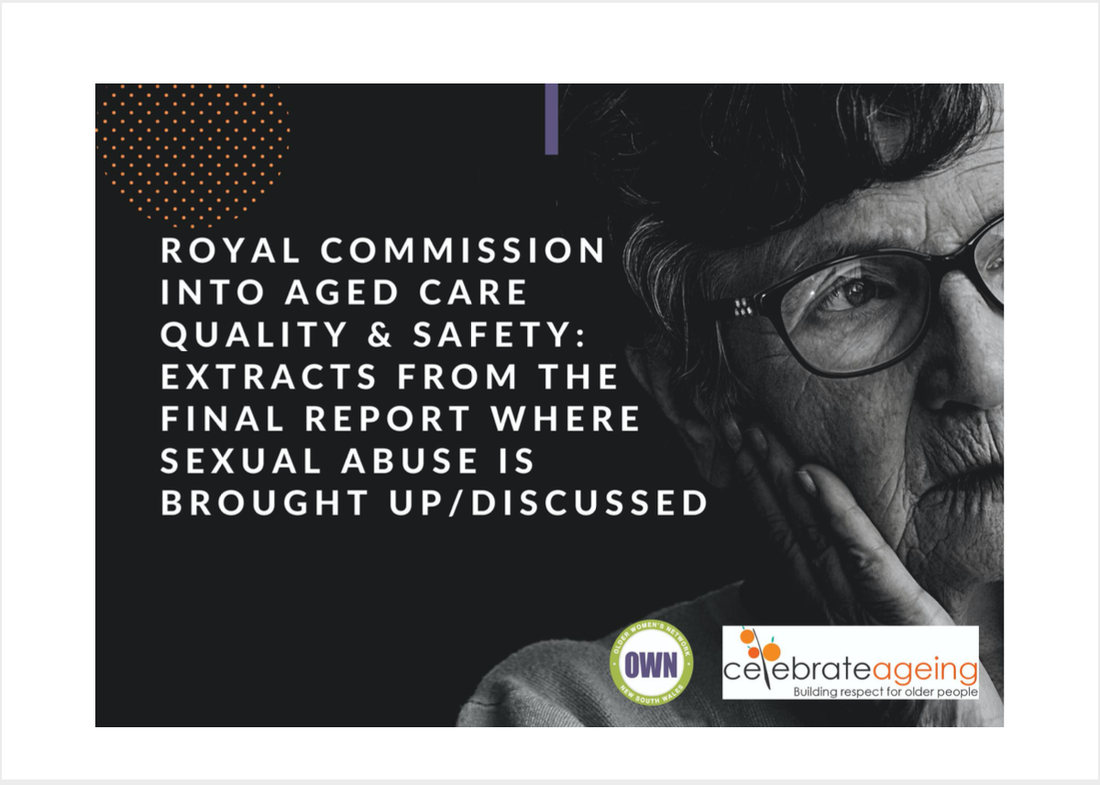The estimated number of alleged incidents of unlawful sexual contact in 2018-19 could be as high as 2520, or almost 50 per week. This is a disgrace and should be a source of national shame.
(The Royal Commission into Quality and Safety in Aged Care, Final Report 2021, p. 150)
The Royal Commission itself received 588 submissions mentioning sexual assault.
(Transcript of proceedings, 22nd October 2020).
Royal Commission into Quality and Safety in Aged Care
The Royal Commission into Aged Care Quality and Safety was established on 8 October 2018 and required and authorised to inquire into the following matters:
- the quality of aged care services provided to Australians, the extent to which those services meet the needs of the people accessing them, the extent of substandard care being provided, including mistreatment and all forms of abuse, the causes of any systemic failures, and any actions that should be taken in response;
- how best to deliver aged care services
- the future challenges and opportunities for delivering accessible, affordable and high quality aged care services
- what can be done to strengthen the system of aged care services to ensure high quality and safe services
- how to ensure that aged care services are person‑centred, including through allowing people to exercise greater choice, control and independence in relation to their care, and improving engagement with families and carers on care‑related matters;
- how best to deliver aged care services in a sustainable way.
Submissions on sexual assault
The Aged Care Royal Commission received 588 submissions mentioning sexual assault. In the Transcript of Proceedings for the Commission on 22nd October, 2020 (page 9681) the following quote was made by Mr P. Rozen QC, counsel assisting the Royal Commission:
"The Royal Commission itself received 588 submissions mentioning sexual assault. There were 426 allegations of sexual assault in residential aged care facilities reported to the Australian Department of Health in 2014-15 and that number of 426 increased to 790 in the year 2018-19. Commissioners, that is more than two reports per day of sexual assault on average, every day of the year. The increase in the reporting of allegations of assault was far greater than could be accounted for by the increase in the number of permanent residents over the same 45 time period. The rate of alleged assaults, that is the number of assaults per 100 residents, nearly doubled from 1.13 to 2.16 in that four-year period."
"The Royal Commission itself received 588 submissions mentioning sexual assault. There were 426 allegations of sexual assault in residential aged care facilities reported to the Australian Department of Health in 2014-15 and that number of 426 increased to 790 in the year 2018-19. Commissioners, that is more than two reports per day of sexual assault on average, every day of the year. The increase in the reporting of allegations of assault was far greater than could be accounted for by the increase in the number of permanent residents over the same 45 time period. The rate of alleged assaults, that is the number of assaults per 100 residents, nearly doubled from 1.13 to 2.16 in that four-year period."
Interim report - Neglect
The Royal Commission into Aged Care Quality and Safety’s Interim Report was launched in October 2019 and is entitled Neglect. The Commission found the aged care system fails to meet the needs of its older, vulnerable, citizens. It does not deliver uniformly safe and quality care, is unkind and uncaring towards older people and, in too many instances, it neglects them. The report does not include any findings related to sexual assault.
Petition
Following the release of the Interim report, the Older Women's Network NSW launched an online petition, calling on the Aged Care Royal Commission to address the issue of sexual assault in their final report. The petition has over 11,000 signatures and includes the following message:

We want the sexual assaults of older women in aged care to stop. There were almost 550 reports of ‘unwanted sexual contact’ in residential aged care in the past year. However, this is just the tip of the iceberg because there is no requirement to report certain types of sexual assaults. Older women in residential aged care and at home are subject to repeated sexual assaults unless action is taken now. Older women in nursing homes are vulnerable to sexual assaults because they are not believed. This means that no investigation is carried out, and no steps put in place to protect the older women from further attacks. This situation is unacceptable and a violation of their human rights. We call on the Aged Care Royal Commission to investigate this issue so that clear processes and systems can be put in place to deal with the reporting and responses to reporting. Measures must also be taken to support the victims and their families. Please sign the petition to protect older women and to stop the sexual assaults from happening. We need to bring this issue to the forefront because sexual assaults happen to women of all ages. Older women deserve to be protected and to be provided with assistance and support when they report these cases.
The Final Report
The Royal Commission's Final report was released in February 2020 and, as highlighted in the quote at the top of the page, calls out sexual assault as a 'national disgrace'. There are numerous references to sexual assault throughout the report and we have highlighted them in a table here, or click on the image below. A very big thankyou to Fiona Ninnes for developing this resource.
Final Recommendations
There are no explicit references to sexual assault in the Royal Commission's Recommendations Report - and no specific recommendations! We have identified some broader recommendations that could influence prevention of sexual assault - see attached report here (coming very soon).
Partnership
Celebrate Ageing and the OPAL Institute were pleased to partner with the Older Women's Network NSW to lobby the Aged Care Quality and Safety Commission to address the sexual assault of older women in aged care and at home.



